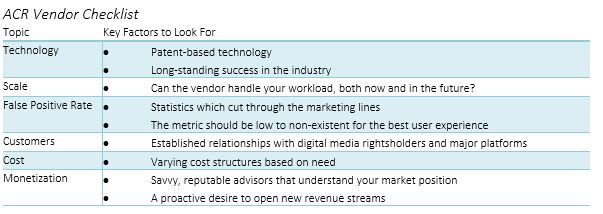AM's CEO Vance Ikezoye Talks About Current Practices at the EU Copyright Stakeholder Meeting
December 16, 2019
Introduction
My name is Vance Ikezoye. I am co-founder and CEO of Audible Magic. With me is Mike Edwards, General Manager and Vice President for the EMEA region. We would like to thank the Commission for this opportunity to speak.
For the purposes of this presentation, we would like permission to use the term “Platform” to represent the Online Content-Sharing Service Providers (OCSSP).
Audible Magic is a technology company that was founded in 1999. Over the past decade, we have been one of the leading providers of copyright identification services to these platforms.
Business Roles and Policies
I would like to share an overview of how we work with Platforms and the Content Industry. Our customer, the party that pays for our services, are the Platforms. The Rightsholders have and must take affirmative action to register their repertoire into our systems. We do not charge Rightsholders for works registration.
Usage and match data are confidential information of the Platform. Any release of that information requires explicit approval by the Platforms. However, our current agreements generally allow us to provide limited information to Rightsholders about the services used by each Platform.
Since the Platforms pay, they have discretion as to what services they use and what content they process.
This arrangement has been working well in practice for over a decade. We believe that most of our customers and rightsholders act in good faith and are trying to do the right thing for all involved, including the consumer.
The Technology
Our service uses a fingerprinting technology which we have developed and continue to enhance. A fingerprinting technology matches content based upon perceptual characteristics of the content itself. It doesn’t rely on metadata or embedded marks. The technology can differentiate between live and studio versions of the same song. We provide services for identifying music and film/video content.
Audible Magic’s scientists were among the early pioneers of audio fingerprinting and obtained many of the first patents in the field. We continue to invest and enhance the technology to keep up with the rapid changes in digital media. We have also been granted an extensive portfolio of patents which provides our customers peace of mind from any threat of litigation for patent infringement. Uniquely, we indemnify our customers against any claims for patent infringement arising from the use of our technology.
Works Registration
We have over 140,000 rightsholders’ content registered in our program across music and film/video. We receive on average 300,000 new works per month. This content comes from over 140 countries. We have a range of rightsholders from major record labels and Hollywood studios with millions of works, to independent singer/songwriters with five tracks. There are no restrictions. Any bona fide copyright owner may register their works with Audible Magic. Most of these registrations are provided to us prior to commercial release or broadcast.
The Registration Process is very straightforward. Rightsholders contact AM; many times they are referred to us by our platform customers. They first sign a simple 2-page registration agreement. We do not charge rightsholders for registration of their works.
Rightsholders then either provide digital or physical copies of their works or we provide them tools to fingerprint the content themselves. They provide us basic information about each copyrighted work, including song titles, artist names, record labels, show titles, season and episode numbers. In addition, for each title, they supply us their designated business rule, such as allow, block, or monetize. We can also support duration-based rules, which for example can enable content under a specified duration to be allowed.
We can manage these rules by Platform. Thus, the same work could be blocked at one platform and allowed for use on another. We ingest the fingerprints, metadata, and business rules into our services. This metadata provides the basis for the information communicated to the Platform when a match occurs. This information is then ingested into our identification system.
Many right holders use third party service providers to register their content with Audible Magic and with other service providers. We strongly support moves by organizations such as ALPA to set up a one-stop-shops to enable their members to effortlessly register with multiple content recognition services including Audible Magic, Facebook, YouTube ContentID and INA.
The Identification Service for Platforms
We work with Platforms to implement our service. Platforms deploy a simple piece of software at the point of ingest after upload by the consumer. This integration is very easy, and the programming required is measured in minutes or hours (at most). This software processes the unknown media and generates the data needed to identify the work. This data is sent to our services via the internet. There is no information about the consumer that is used or transmitted to us. Each identification request is processed in less than a second and the service returns the metadata and business rules associated with the matched work back to the Platform.
There are various configurations of the identification technology which are optimized for each platform and their specific use case. We try to balance the thoroughness of the analysis against the cost of the service. In general, the current technology standards that our customers utilize is the unknown content contains 20 contiguous seconds matched to the registered copyrighted content for longer form content, and 5-10 contiguous seconds for short form content.
Every month we process over 3-billion identification requests per month from our customers. At peak, we can process over 8,000 requests per second. These volumes demonstrate the scale of user generated content on social video platforms.
With regards to Staydown capabilities, we have been providing that service since 2008, however most of our Customers have not implemented this feature.
Our customers are diverse. Platforms take the form of websites and mobile applications. Our customers range from some of the largest platforms in the world to small platforms in Africa and Southeast Asia. We have platforms that handle hundreds of files a month and platforms that do thousands per second.
The customers range in technical capabilities. We have small platforms with the CEO acting as the software programmer to major platforms with teams of engineers and lawyers. We have platforms that utilize the ad-support monetization model and those that are subscription-based. As a general rule, most of our platforms do not broadly monetize their UGC videos.
Legitimate Technical Issues
In the course of these Commission Dialogue meetings, there have been a number of issues discussed by the various Stakeholders. Many of these issues are legitimate and worthy of continued discussion. We’d like to briefly comment on some of them:
False Positives and Over-Blocking
The use of an identification technology is the only practical method of dealing with the volume of user content being generated. Since this is an automated process, accuracy is perhaps one of the most important requirements for an identification technology. All technologies are not alike. My co-founder used to say that it is very easy to invent a bad technology. And the reality is that technologies can be optimized for one attribute at the expense of others.
We believe that incorrectly identifying a work, a false positive, is a critical error and therefore ensuring misidentifications are essentially zero is the single most important objective for a production technology. We believe false identifications lead to over-blocking, attributing rights to the wrong content, or platforms having to manually review results.
One example of where false positive problems can occur is with measuring too short a duration of content. Trying to use fingerprinting technology to match one or two seconds of audio is like trying to match two compositions based upon two musical notes.
Copyright Exceptions
Copyright exceptions require a high degree of intellectual judgement and an understanding and appreciation of context. We do not represent that any technology can solve this problem in an automated fashion. Ultimately, these types of determinations must be handled by human judgement. However, identification technologies can supply data which can be used to enable more informed copyright exception analysis.
We fully support the call by many of the organizations representing consumer rights for transparent, accessible, and speedy appeal processes, administered by humans as the optimum way of addressing the issue. We also want to recognize that several of our customers have described in their presentations during these proceedings their redress mechanisms. It is probably because of these redress mechanisms that, in the more than 12 years we have been providing content recognition services to some of the world’s largest platforms, that we have not become aware of any serious or systematic issues in this area.
High Industry Standards
There has been much discussion with respect to the High Industry Standards language of the Directive. We believe that a copyright identification service which meets this bar must have at least the following attributes: First, service must be representative of global content. The service must be accessible and supported by a critical mass of rightholders, who have affirmatively registered their content. And it must be a turnkey and affordable solution for the range of platforms. We believe there are a number of commercially available content recognition services for the music and film/video industries that meet these criteria. Although this is a difficult issue, the drafting of the Directive was very thoughtful with respect to the recognition of the ongoing evolution in media and continuing improvement of technology to identify it.
Complexity of Licensing Administration
The clear intention of the Commission with the Directive is to encourage licensing of content by the Platforms. The reality is that there are complexities related to both the licensing of content as well as the administration of the licenses and royalties. These complexities cause issues of time and expense for both platforms and the rightsholders. The problem logistically is how to manage the sheer number of rightsholders and size of catalogs that exist globally. And an added comment, roughly 90% of the titles registered with us never get identified, even once out of the 3 billion identifications we perform every month, across our platform customers.
Red Herrings
On the other side of these proceedings, there are some issues that continue to be raised as concerns related to the use of identification technologies. These concerns I would characterize as “Red Herrings”.
Cost of the Service
The first Red Herring I would like to mention is the cost of the service. Our service fees are based upon the number of files processed. So smaller platforms with fewer files, pay less than large platforms. We have customers that pay a few hundred Euros per month. In addition, there is an active and competitive market for content identification services, and there is no need for any platform to make the capital investment to develop their own technology. Some of the biggest and smallest platforms in the market are customers of ours.
Cost and Difficulty of Implementation
Another frequently heard Red Herring is the issue that the technical implementation of identification services is time consuming and difficult. We have had customers implement our technology in minutes based only upon our documentation. We also make available technical support to our customers, to help them implement our solutions.
Technology Maturity
We believe that the technology for identification is mature and presents a viable solution to all sizes and types of Platforms. We believe this because our customers prove it. Our services have been used by scores of platforms reliably and non-controversially for over a decade.
Future Directions
With that said, there are areas the tech industry can help both platforms and rightsholders in implementing both the letter and intention of the new Directive. One of the biggest areas, which we cited previously as an issue, is in licensing and royalty administration.
We believe that the content licensing effort for both the platforms and rightsholders is very complex and time consuming. Because platforms are global and rights are by territory, licensing for a platform is a non-trivial exercise.
Secondly, once licenses have been obtained, the effort to administer and report on usage and royalties is very difficult for the platforms. And on the other side, the rightsholders have an equally challenging and difficult time processing and understanding the reports provided by the platforms.
We think this is an area where the technology vendors, such as Audible Magic, can provide further value to supporting the goals of the Commission with Article 17 – which is to enable a more frictionless environment for licensing and use of copyrighted content by consumers and platforms.
I can report that we are collaborating with many music right holders and platforms to develop simple, one-stop licensing processes, and to develop the tools for license management and administration that will remove the need for individual platforms to invest in building these systems themselves. We will be making further announcements in this regard as these systems are launched.
Thank you.
For more information on the fourth meeting of the stakeholder dialogue, you can visit the following page.
Plan Now
It is important to start planning now on how to meet the requirements and understand the impact of the Directive on your business.
Below are some resources to help you understand the Directive and how it may impact your business.
- Take our A17 Assessment Survey for platforms to assess if the Directive affects your company and then assess your readiness to comply
- Learn more about the impact of the EU Copyright Directive on live streaming platforms
- Understand how small social networks will be impacted
- Read the full text of the Directive
- And more is available on our Article 17 page as well as in our blog section
How Will the Practical Implementation of Article 17 Work?
As EU Member States Move to the Transposition of Article 17, EU Commission Holds the First of Several Stakeholder Dialogues
The October 15th Meeting
The Commission has set up a series of required stakeholder dialogues to explore best practices for cooperation between the online content sharing service providers (OCSSPs) and the rightsholders.
Guidance for Implementation
The input provided by attendees will help the Commission create a document to be published later next year that will provide guidance to member states regarding the implementation of Article 17.
The first stakeholder meeting on October 15 was focused on the OCSSPs, and the music rightsholders, as well as consumer rights organizations. Facebook, Twitter, YouTube, Vimeo and Soundcloud provided the OCSSP perspective. Representatives for record labels, Copyright Management Organizations and music publishers included IFPI, GEMA, ICMP to name a few.
Generally, the rightsholders addressed the following:
- Transparency and regularity of reporting of usage.
- Wider access for all right holders to rights management tools like YouTube’s Content ID.
- Consistent support of take down/stay down from the platforms.
- Several rightsholders stated that the platforms should use Automatic Content Recognition (ACR) software, which they described as affordable and highly accurate.
- Songwriter representatives called for the deployment of technology that recognized compositions in addition to sound recordings
The OCSSPs covered a variety of areas including:
- The policies and procedures that they have in place regarding the usage of copyrighted works, often referring to DMCA.
- Although many of the OCSSPs have licensing agreements with major rightsholders, several wanted more guidance regarding what entails best efforts to obtain licensing deals required by Article 17.
- Several platforms spoke about their usage of Automatic Content Recognition technology.
- Representatives of the startup community voiced their concerns about the practical implementation of the provisions for startups:
- The lack of expertise and funds needed to negotiate licensing deals with large rightsholders.
Consumer organizations warned that over-blocking could suppress free speech and highlighted the potential issues of false positives and blocking of uploads subject to copyright exceptions. They stressed the need for OCSSPs to implement transparent and speedy appeal processes for users, and to encourage their use.
Both sides reiterated that the cooperation regarding the usage of copyrighted material would benefit the platforms, artists, and users. In addition, each party wanted to encourage licensing and minimize over-blocking.
Webcast of the October 15th meeting: https://webcast.ec.europa.eu/copyright-stakeholder-dialogues.
Plan Now
It is important to start planning now on how to meet the requirements and understand the impact of the Directive on your business.
Below are some resources to help you understand the Directive and how it may impact your business.
- Take our A17 Assessment Survey for platforms to assess if the Directive affects your company and then assess your readiness to comply
- Learn more about the impact of the EU Copyright Directive on live streaming platforms
- Understand how small social networks will be impacted
- Read the full text of the Directive
- And more is available on our Article 17 page as well as in our blog section
Audible Magic Adds to its Experienced Management Team
Industry Veterans Add Invaluable Expertise to Address UGC Market Opportunities
Los Gatos, Calif. (Dec. 11, 2019) – Audible Magic, the leader in content identification solutions, announced it has augmented its leadership team with individuals with extensive experience in licensing and monetization of copyrighted audio and video content. As a trusted vendor in the industry, Audible Magic is committed to providing services which benefit both UGC platforms and rights holders. The company has been developing programs to enable the licensing and monetization of UGC content on social media platforms.
The additions include David King, strategic advisor; J. Gibson, senior director of Content Operations and Rights Administrations; and Kuni Takahashi, vice president of Account Services and Sales.
“Our mission to accelerate the distribution and monetization of copyrighted content for social media is enhanced through the vast knowledge of our world-class leadership team,” said Vance Ikezoye, president and chief executive officer of Audible Magic. “We are extremely proud to add David, J. and Kuni to our team as they enhance our ability to navigate the complexities of the media industry on behalf of our clients.”
King served as a group product manager at Google and is well recognized for creating YouTube’s Content ID platform, allowing YouTube to license and monetize UGC at scale. King began working in online media as part of the founding team that created the Rhapsody Music service where he was responsible for managing label relationships and building the first highly scaled online music catalog. He has also held positions at OD2, SESAC, and a variety of other media platforms. He has worked at the forefront of online media, innovating on products that underpin the migration of content to on demand streaming platforms.
Gibson was the senior director of content operations at Dubset Media Holdings where he directed and built teams to support content operations, rights administration, editorial management and other functions. He was previously the head of content strategy at Rumblefish where he created digital strategies and offerings for rights management and royalty collection opportunities.
Takahashi was a senior member of the business development team for Rumblefish/HFA, a subsidiary of SESAC. He has also served as an investment banker driving significant music industry deals, such as Google’s acquisition of RightsFlow and SESAC’s acquisition of Rumblefish.
About Audible Magic
For more than 20 years, Audible Magic has innovated solutions to identify content, manage rights, and monetize media. Audible Magic’s Emmy-winning automatic content recognition (ACR) technology powers billions of transactions monthly. The Silicon Valley pioneer is the trusted intermediary among rights holders (including labels, studios, distributors, publishers, and collectives) and major platforms.
Contact
Adriana Saldaña
Sterling Communications
[email protected]
+1 408-395-5500
###
Am I Impacted by Article 17 of the EU Copyright Directive?
If your mobile app or website allows sharing of user-uploaded content, then the answer is probably yes. Two keys things to understand regarding your business and Article 17:
- Although written in Europe for European Union member states, Article 17 can impact any mobile app or website that can be accessed by people living in the European Union.
- To understand the impact of the initiative on your business you need to understand how Article 17 categorizes your business.
OCSSP Definition
The directive creates a new acronym, an OCSSP, which is an “online content-sharing service provider”. Here’s what the text of the directive defines as an OCSSP:
“A provider of an information society service of which the main or one of the main purposes is to store and give the public access to a large amount of copyright-protected works or other protected subject-matter uploaded by its users, which it organizes and promotes for profit-making purposes.”
From this, there are at least five key criteria:
- If your service allows users to upload content
- Your service gives the public access to that content
- The content includes a “large” amount of copyright-protected works
- Your service is for profit-making purposes
- You organize and promote the content in some way (e.g. make it searchable, serve content up to certain users)
Exclusions
The directive does include some exclusions to the definition of the service provider definition above:
- Not-for-profit entities which include online encyclopedias (for example Wikipedia)
- Educational and scientific repositories
- Open-source software sharing platforms
- Electronic communication service providers
- Online marketplaces
- B2B cloud services
- Cloud services for user’s own use.
There are some specific exceptions for new and small companies, which limit how Article 17 applies to their service but does not alleviate legal obligations to address unauthorized copyright content. Check back for our next installment covering how smaller OCSSPs need to meet the requirements of Article 17.
Disclaimer: The information we provide should not be considered legal advice. While we work to be sure our information is accurate and useful; we recommend you consult an attorney.
Plan Now
It is important to start planning now on how to meet the requirements and understand the impact of the Directive on your business.
Below are some resources to help you understand the Directive and how it may impact your business.
- Take our A17 Assessment Survey for platforms to assess if the Directive affects your company and then assess your readiness to comply
- Learn more about the impact of the EU Copyright Directive on live streaming platforms
- Understand how small social networks will be impacted
- Read the full text of the Directive
- And more is available on our Article 17 page as well as in our blog section
Audible Magic Delivers Expanded Content Identification for Short-Form Video
Los Gatos, Calif. (Nov. 13, 2019) – Audible Magic, the leading provider of content identification solutions, announced it has expanded its services to provide copyright compliance and monetization for short form video found on social networks. The expanded service is available immediately. With the explosive growth and popularity of short-form videos, typically 15 seconds or less, there is a need to automatically identify copyrighted content of very short duration.
This capability supplements the company’s industry leading service for long form video, which has been adopted by the social media platforms. The service adheres to the same high standards with exceptional identification rates and virtually zero errors. With the 24/7 nature of social media, the service operates at scale with sub-second response times. As a turnkey solution, the service is easily integrated and is cost-effective for a range of companies – from large global platforms to small startups; and websites to mobile apps.
The new service is integrated into the company’s recently announced UGC Music Rights Platform (UMRP), which provides a comprehensive program to facilitate the licensing and monetization of music on social media platforms.
“We’re laser focused on providing copyright solutions for user-generated content on social media platforms,” said Vance Ikezoye, president and chief executive officer of Audible Magic. “This expanded solution uses our robust technology to support the compliance and licensing of content used in short user clips, which is a significant growth area for our customers.”
About Audible Magic
For more than 20 years, Audible Magic has innovated solutions to identify content, manage rights, and monetize media. Audible Magic’s Emmy-winning automatic content recognition (ACR) technology powers billions of transactions monthly. The Silicon Valley pioneer is the trusted intermediary among rightsholders (including labels, studios, distributors, publishers, and collectives) and major platforms.
Contact
Adriana Saldaña
Sterling Communications
[email protected]
+1 408-395-5500
###
6 Things You Must Ask Your Automated Content Recognition (ACR) Vendor
Automated Content Recognition, or ACR, has become an integral part of the consumption of music and video as we experience them today. As more platforms publish user generated content, effectively monitoring use of copyrighted material has become increasingly difficult. So, how does one choose an ACR vendor that can be relied on?
_____________________________
Guest post by Audible Magic VP of Product Development and Marketing, Jay Friedman on Hypebot.com
Automated Content Recognition (ACR) is essential to music and video consumption as we know it today.
An important aspect for companies distributing content with music and video is the aspect of digital media rights. With the explosion of user generated content, it has become increasingly difficult to monitor and manage the proper use of copyrighted material.
Platforms distributing user generated content typically come from a purely technological background and can easily overlook important aspects of digital media rights. This oversight can cripple a business either via an infringement lawsuit or shortage of capital, especially since content platforms vary widely from large technology providers to popular apps to yet undeveloped offerings.
As an example, the European Union recently approved Article 17 requiring companies who host user generated content and have a European presence or customer base to take responsibility to either license works or prevent usage of unlicensed user-uploaded copyrighted material. If a user uploads a piece of content that infringes copyright, the platform is at risk. According to Article 17, platforms must filter users’ uploaded content for copyright materials or have a license for it.
What’s an online platform to do? Finding a vendor for ACR is a vital business activity for those who are subjected to dealing with digital media rights. This technology puts in place a method for platforms to protect copyrighted content from being improperly used. But with several to choose from, what is the criteria to look for? How does one determine which vendor is appropriate for their business? How can one ensure that the services provided are cost-effective and necessary? Here are six things to look for (or even ask directly) when making a determination.
What is the pedigree of the technology?
ACR is a technology service, so it only makes sense to start the hunt for a vendor by exploring the merits of the technology itself. Ask if the vendor holds patents which the ACR is built upon, or if the technology is licensed from another company. The answer will give you a clue if the vendor will be capable of addressing emerging market challenges in stride. A strong R&D department is a great indicator of a vendor that seeks to push the industry forward.
Does the service scale well?
Does your company need to monitor the usage of a handful of digital media rights, or do you have to cover just about everything under the sun? Several pop-up ACR vendors have appeared recently to address the former, sometimes licensing technology or developing a service that satisfies one specific task needed. These pop-ups are worth investigating if your needs are truly specific and limited in scope, but take caution to ensure that they’ll be able to handle an increased workload as your service demands grow and – more vitally – the amount of content that needs to be scanned or monitored increases.
What is the technology’s false positive rate?
Take heed of the false positive rate, the fine print statistic that cuts through any misleading marketing metrics. If a vendor boasts scalability as a primary value proposition, asking about false positive rate is the follow-up question that will help you find out if service quality was sacrificed in order to achieve scale. A false positive rate of even 0.5% means that for every 1,000 pieces of digital media scanned, five will be mistakenly given an incorrect attribution of ownership. The effect that this has on user experience cannot be understated. A spotty experience easily translates to the loss of users or customers.
Who are the customers?
This segues neatly into the next question. The music industry is chalk full of long-standing partner relationships. Top labels are going to work with vendors they trust to protect their catalogs, and will be hard-pressed to change from companies they trust to do the job right. On the flip side, UGC platforms want to ensure they are in full compliance for rights usage and desire a vendor that understands international nuances – that their vendor has they’re backs. Entertainment may be “fun” to the everyday citizen that consumes media, but in the business world the emphasis is on the bottom line and sound practices. If you recognize a vendor’s customers as major players, that’s a good indicator that the vendor has an established cadence of trust.
What will this cost?
ACR is the technology that the digital media rights ecosystem can’t afford to not have. That said, what good is an ACR vendor if a company can’t afford the service in the first place? Vendors shouldn’t offer a one-size-fits-all solution at a single premium price; rather, cost should reflect the level of service that is being provided. After all, distributors and platforms have varying policies and needs when it comes to identification reporting. Some companies seek basic identification, while others desire advanced reporting and other features. Know what your needs are before you shop, or find a vendor that will help you determine what’s right for you based on your business model and policies.
Will the vendor find ways to open new revenue streams?
This question falls outside the normal line of thinking for basic software-focused ACR vendors, which makes it a hardnose test of business smarts. Those who know how the digital media rights landscape works will be able to work collaboratively with you to suggest and enable new revenue streams. Not only should a vendor have a line of questioning to understand your business model and connect the dots, they should be actively engaged in trying to improve your company. This doesn’t fall outside of the realm of what should be expected from a vendor, because savvy ones know that your success ultimately becomes their success. This line of thinking makes an ACR vendor a valuable asset as an advisor. Keep in mind there’s no substitute for management that has been there, done that, and can draw from the industry to help you succeed.

###
MORE: DistroKid Links With Audible Magic To Verify Music Authenticity, Launches DistroLock
Guest Post on 06/13/2019 in Music Business, Music Tech, Publishing & Songwriting, Streaming, YouTube & Video | Permalink | Comments (0)
Tags: ACR, Amazon, Apple, Apple Music, Google, indie, metadata, music, music business, music industry, music tech, musician, musicians, Pandora, Spotify, YouTube
https://www.hypebot.com/hypebot/2019/06/6-things-you-must-ask-your-acr-vendor-.html
Audible Magic Inks Global Partnership with DistroKid to Verify Music Authenticity
Amidst news of unreleased music impersonators, partnership ensures protection of artist’s original content on music streaming services and social platforms
June 12, 2019 (LOS GATOS, Calif.) – Audible Magic, music’s industry standard for content identification linked to digital rights, announced a strategic partnership with leading music distribution service DistroKid to combat the rising trend of “fraudulent artists” stealing and uploading unreleased original content. The move will help protect artists worldwide by verifying the authenticity of both tracks and artists that the music originated from before music is distributed to streaming services.
When an artist requests to upload song files via DistroKid, Audible Magic’s RightsRx™ solution checks its comprehensive registry of over 20 million media assets to ensure the artist-uploaded content is conflict-free before distribution to streaming services like Spotify, Apple Music, YouTube and more. In its ongoing effort to promote artist authenticity, DistroKid will also be the first distributor to implement Audible Magic’s cutting-edge detection tool, Broad Spectrum. An extension of Audible Magic’s content identification service, Broad Spectrum can uniquely identify extreme manipulations of rate, pitch and tempo using only small clips of audio.
“In this day and age, it’s imperative for artists everywhere to register their content to not only claim ownership, avoiding impersonators, but to also ensure that they are being accurately credited and compensated,” said Vance Ikezoye, president and chief executive officer at Audible Magic. “DistroKid has a positive reputation amongst artists for making distribution fast, reliable and easy. This partnership signals our joint commitment to an industry working towards clean data, proper rights management and improved artist attribution.”
Additionally, in response to the increase in fake artists attempts to steal and distribute unreleased music, DistroKid is announcing a new and free service called DistroLock (https://distrolock.com). Launching today, DistroLock allows any musical artist to upload and register their unreleased audio files through the platform, which will encode a unique audio fingerprint and add it to Audible Magic’s registry. DistroKid developed this platform with Audible Magic’s insights as an industry-wide solution that will request to block the unauthorized release of an artist’s music (or “leaks”) from appearing on streaming services and social platforms. DistroLock also includes an API that will allow other distributors and streaming services to easily validate the authenticity of music uploaded to their respective platforms before making it available to the public.
“Until now, there hasn’t been a definitive way for artists to say, ‘this is my audio, don’t let anyone else release it,’” said DistroKid chief executive officer Philip Kaplan. “With the launch of DistroLock, any musician can preemptively register their
audio to help ensure that unauthorized releases don’t see the light of day. This partnership with Audible Magic and the creation of DistroLock will help artists by ensuring that their original content is uploaded and distributed fairly, with accuracy and speed.”
About DistroKid
DistroKid was founded in 2013 to provide musicians, managers, and record labels with online tools and services that are innovative, easy-to-use, and affordable. More than 400,000 artists rely on DistroKid and include hobbyists, up-and-coming musicians, top YouTubers, and international superstars like 21 Savage, Ludacris, Will Smith, Tom Waits, and more. DistroKid’s expanding array of services include music distribution, monetization, metadata customization, storage, and promotion. DistroKid’s small staff, coupled with largely automated backend, has enabled DistroKid to process more than 7 million songs—while simultaneously providing fast, personal & friendly customer service to artists of every size.
About Audible Magic
For more than 20 years, Audible Magic has continuously created innovative, industry-leading solutions that protect digital media and accelerate its monetization. An Emmy-winning pioneer in proprietary content recognition solutions, its core identification platform performs billions of nearly instantaneous content match transactions every month. Audible Magic has become the trusted intermediary between the majority of rightsholders (music labels, distributors, publishers and collectives) and digital service providers (such as Facebook, SoundCloud, Dailymotion, and Twitch), navigating the complexities of content identification, ownership determination, and rights administration.
Apple's & Spotify's Distributor Tiers Raise the bar for Catalog Management
Audible Magic Offers New Services to Manage Distribution Conflicts
In 2018, the top digital service providers (DSPs) publicized their preferred distribution partners and their ranking criteria. For Apple, whose ranking criteria includes exceptional content review" and "low rejection rate," CD Baby and The Orchard made the "Preferred Plus" list. For Spotify, whose criteria lists "preventing infringement content," The Orchard made the "Preferred" list while CD Baby made the various "Recommended" partner lists.
a 9.2% increase over 2017 - Buzz Angle
The challenge of adhering to these strict DSP guidelines while the keeping pace with the huge growth in the space is daunting for digital distributors. Digital distributors must manage current catalogs and ingest large numbers of tracks every day in an efficient and cost-effective way. Buzz Angle Music’s 2018 report on U.S. music consumption indicated that the number of unique titles audio-streamed was 36.3M tracks, a 9.2% increase over 2017. The sheer number of tracks eliminates manual review and metadata checks prove to be unreliable.
As a result, digital distributors use automated content recognition (ACR) technologies to scan new releases, as well as their back catalog, to ensure they can meet these strict content review requirements. A distributor can improve their overall score and ranking if they can deliver a clean catalog that doesn’t create a lot of copyright ownership conflicts at a DSP. The impact on their business is significant. For example, as an Apple Music Preferred Plus distributor a company will have access to support for advanced customer features and analytics as well as early access to product features.
Audible Magic’s newly launched services, RightsAudit™ and RightsRx™ are a great cost-effective way to proactively identify potential ownership conflicts prior to delivering to a DSP. Audible Magic’s ACR technology combined with one of the most comprehensive and most up-to-date reference databases in the world provides a highly accurate and method to compare audio and video recordings.
Learn more about The Orchard and CD Baby partnering with Audible Magic for catalog management.
CD Baby and Audible Magic Team Up to Ensure Quality Partnership with Artists and Music Services
Portland, Oregon, (April 16, 2019) – Artist Service Provider CD Baby is partnering with Audible Magic – the music industry’s go-to expert in digital content identification, licensing, and monetization – to increase content protection for artists and labels. As part of the partnership, CD Baby will use Audible Magic’s RightsRx™ service to identify content rights conflicts prior to delivery to a Digital Service Provider (DSP), ensuring that CD Baby remains a trusted distribution partner of digital platforms worldwide.
As streaming continues to grow exponentially, both companies are at the center of one of the music business’s greatest opportunities and biggest challenges: How do distributors and artist service companies concurrently manage growing data volumes, comply with DSP requirements, and still provide the best service to musicians, all in a cost-effective manner?
“Audible Magic is an essential element that enables us to play our role in the music business,” said CD Baby Vice President Kevin Breuner. “Their powerful identification technology allows us to serve our artists – and the platforms and services they rely on – quickly and fairly.”
When a user requests to upload files, RightsRx™ allows CD Baby to check Audible Magic’s comprehensive registry of over 30 million media assets. RightsRx™then indicates if the file is a duplicate of another audio track in the system, or if it is a potentially suspicious file. CD Baby can proactively decline to upload the file in question, rather than reactively taking it down at a later time due to a potentially costly rights conflict. In the vast majority of cases, however, files will upload seamlessly and be ready for distribution.
“CD Baby plays a vital role in the independent music community. We look forward to supporting their ongoing efforts to provide the highest quality of service to their artists and maintain strong relationships with the DSPs,” said Vance Ikezoye, President and CEO at Audible Magic.
RightsRx™ is part of a bigger strategy at CD Baby to be the best partner possible to diverse music services and an even more diverse community of artists. This demands constant learning, extensive tech savvy, and real creativity.
“We’re doing everything in our power to provide digital partners with data and assets that boost our artists. We want to create the best experience via these partnerships,” said MJ Woodis, CD Baby’s Director of Digital Operations who leads a 15-person team that addresses this challenge. “We work closely with DSPs, and it’s often more of a conversation, not just rules laid down. The heart of the matter is not to restrict as we get them music and data, and to enable search and other discovery methods to help our artists. It’s a growing process.”
About CD Baby
CD Baby is one of the largest distributors of independent music on the planet, home to 650,000 artists and more than 9 million tracks that are made available to 100+ digital services and platforms around the globe. Artists on the platform are empowered to monetize their rights while maintaining control of their own careers and have collectively earned over $600 million since the company’s founding. CD Baby’s Publishing Administration service allows over 160,000 songwriters to collect all of their publishing royalties and currently administers over 1 million songs.
About Audible Magic
For more than 20 years, Audible Magic has continuously created innovative, industry-leading solutions that protect digital media and accelerate its monetization. An Emmy-winning pioneer in proprietary content recognition solutions, its core identification platform performs billions of nearly instantaneous content match transactions every month. Audible Magic has become the trusted intermediary between the majority of rightsholders (music labels, distributors, publishers and collectives) and digital service providers (such as Facebook, SoundCloud, Dailymotion, and Twitch), navigating the complexities of content identification, ownership determination, and rights administration.
- # # # -
The Orchard Partners with Audible Magic to Address Industry-wide Problem of Verifying Music Rights Ownership
Audible Magic Announces Two Services to Impede Improper Distribution of Music
Los Gatos, Calif., (February 26, 2019) – Audible Magic announced two new services, RightsAudit™, and RightsRx™ to address the industry-wide problem of distribution conflicts between rights owners and their respective music catalogs. As the world’s leading music and video distribution company, The Orchard has long recognized Audible Magic’s value and trusts them to strengthen their well-versed rights management procedures.
The process for music distributors to verify rights ownership across more than 200 territories before new music is added to a catalog is complex and extremely challenging. Both Audible Magic’s services dramatically simplify the determination of a conflict. The service will identify a whole track or clips from that track that have been registered by other rights holders in any territory. A conflict exists if a match is found both with the audio of the underlying sound recording and more than one rights owner has registered that content in the same territory.
Audible Magic’s, industry-leading, Emmy award-winning, content recognition technology performs a deep analysis that reveals conflicts often in small clips of music audio. Audible Magic’s catalog contains rights ownership information on over 25 million music tracks.
Both services are monthly subscriptions and can easily fit with a company’s content management system and existing workflows. RightsRx™ is an entry-level lower cost version of RightsAudit™.
“We are excited to offer these two services to begin to address a significant industry-wide problem, in an easy and cost-effective way,” said Vance Ikezoye, President and CEO at Audible Magic.
“Audible Magic’s tools provide a huge service to us. Rights management is an essential part of the business and it is important to make sure artists and labels are getting the revenue they deserve,” said Tucker McCrady, EVP & General Counsel at The Orchard.
Learn more about RightsAudit™ and RightsRx™.
About Audible Magic
Founded in 1999, Audible Magic is an Emmy award-winning, trusted software, and services company enabling the efficient and accurate management of copyright compliance and licensing in the music and entertainment industries. Audible Magic’s robust, scalable solutions enable digital service providers such as Facebook, Vimeo and DailyMotion hosting user-generated content to proactively and in real time to identify and comply to often complex right’s holder requirements. As an independent third-party vendor with 20 years of expertise in copyright compliance, Audible Magic is meeting the needs of the rapidly growing user-generated content hosting and streaming entities. For more about Audible Magic visit. www.audiblemagic.com.
About The Orchard
The Orchard is a leading music distribution company operating in over 40 markets worldwide. With a comprehensive artist & label services offering including full-service marketing, sync licensing, comprehensive video services, transparent data analysis, advertising, rights management, digital and physical distribution and more, The Orchard empowers creators and businesses to grow and adapt in the dynamic global industry. For further information, visit www.theorchard.com.
Press Contact
Audible Magic Corporation
Julia Hutchinson










